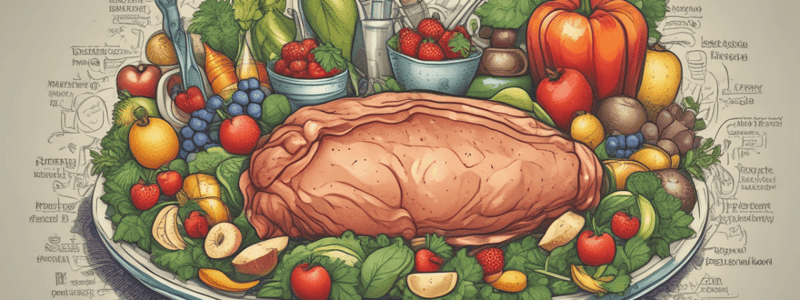Podcast
Questions and Answers
What is the primary goal of health professionals providing nutritional education or prescribing diet plans?
What is the primary goal of health professionals providing nutritional education or prescribing diet plans?
- To reduce protein consumption
- To prevent and manage obesity and its comorbidities (correct)
- To promote weight gain
- To increase caloric intake
What type of diets have been proposed as an alternative nutritional intervention for patients?
What type of diets have been proposed as an alternative nutritional intervention for patients?
- High-fat, low-carbohydrate, and high-protein diets (correct)
- Low-fat, high-carbohydrate, and low-protein diets
- Low-fat, high-protein, and low-carbohydrate diets
- High-carbohydrate, low-fat, and high-protein diets
Why must high-fat, low-carbohydrate, and high-protein formulations be guided by proficient health professionals?
Why must high-fat, low-carbohydrate, and high-protein formulations be guided by proficient health professionals?
- To follow strict guidelines that must be reviewed regularly (correct)
- To reduce costs
- To promote weight loss
- To ensure patient compliance
What is a concern regarding specialized enteral nutritional formulas designated for critical care patients?
What is a concern regarding specialized enteral nutritional formulas designated for critical care patients?
What is the focus of the review mentioned in the text?
What is the focus of the review mentioned in the text?
What is the condition of patients who may benefit from high-fat, low-carbohydrate, and high-protein diets?
What is the condition of patients who may benefit from high-fat, low-carbohydrate, and high-protein diets?
What is a limitation of current guidelines addressing nutritional needs?
What is a limitation of current guidelines addressing nutritional needs?
What is the role of specialized enteral nutrition formulas in critical care patients?
What is the role of specialized enteral nutrition formulas in critical care patients?
What is the primary objective of the narrative review?
What is the primary objective of the narrative review?
Why is it essential to ensure that critically ill patients receive adequate nutrition?
Why is it essential to ensure that critically ill patients receive adequate nutrition?
What is the consequence of overfeeding in critically ill patients?
What is the consequence of overfeeding in critically ill patients?
What is the primary goal of feeding in critically ill patients?
What is the primary goal of feeding in critically ill patients?
Why is it important to assess the outcomes of high protein, fat, and branched-chain amino acid formulas in critically ill patients?
Why is it important to assess the outcomes of high protein, fat, and branched-chain amino acid formulas in critically ill patients?
What is the concern regarding formulary restrictions related to cost management in critical care nutrition?
What is the concern regarding formulary restrictions related to cost management in critical care nutrition?
What is the focus of the mini review in critical care medicine?
What is the focus of the mini review in critical care medicine?
Why is diet considered an essential element of care in critical care medicine?
Why is diet considered an essential element of care in critical care medicine?
Study Notes
Nutritional Education and Diet Plans
- Health professionals provide nutritional education and prescribe diet plans to prevent and manage obesity and its comorbidities, such as cardiovascular and infectious diseases.
- Nutrition therapy is a crucial part of treating comorbidities.
High-Fat, Low-Carbohydrate, and High-Protein Diets
- These diets have been proposed as an alternative nutritional intervention for patients with a poor prognosis or higher demand for healing rate and overall survival.
- They must be indicated and guided by proficient health professionals, following strict guidelines that must be reviewed regularly.
Background and Rationale
- Guidelines addressing nutritional needs are well-known and cited worldwide, but little is known about the implications of the quality of food.
- The question arises whether feeds should contain more fat, protein, and fewer carbohydrates.
Critical Care and Diet
- In critical care, diet is as crucial as the dose of a drug or a mechanical ventilation parameter.
- Critically ill patients have a high basal metabolic rate and rapidly deplete their nutrient reserves.
- Clinical nutrition should provide the necessary energy, macro- and micronutrients, and an anti-inflammatory agent in the right ratio.
- Overfeeding and underfeeding have severe consequences, including higher mortality, protein catabolism, and liver dysfunction.
Objectives and Scope
- This review aims to update the current role of high-fat and high-protein formulas in critical care medicine.
- The review assesses the potential roles of these formulas on outcomes such as costs, mortality, and morbidity.
- The end goal is to examine clinical utility, areas of concern, and clinical outcomes and research benchmarks.
Studying That Suits You
Use AI to generate personalized quizzes and flashcards to suit your learning preferences.
Description
Learn about the importance of nutrition education and diet plans in preventing and managing obesity and its related diseases. Discover the role of specialized nutrition formulas and diets in treating comorbidities.


